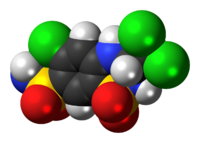Chemistry:Trichlormethiazide
 | |
 | |
| Clinical data | |
|---|---|
| AHFS/Drugs.com | Micromedex Detailed Consumer Information |
| Pregnancy category |
|
| Routes of administration | Oral (capsules, tablets, oral solution) |
| ATC code | |
| Legal status | |
| Legal status |
|
| Pharmacokinetic data | |
| Bioavailability | Variably absorbed from GI tract |
| Excretion | Primarily excreted unchanged in urine |
| Identifiers | |
| |
| CAS Number | |
| PubChem CID | |
| IUPHAR/BPS | |
| DrugBank | |
| ChemSpider | |
| UNII | |
| KEGG | |
| ChEMBL | |
| Chemical and physical data | |
| Formula | C8H8Cl3N3O4S2 |
| Molar mass | 380.64 g·mol−1 |
| | |
Trichlormethiazide (INN, currently being sold under the brand names of Achletin, Diu-Hydrin and Triflumen) is a diuretic with properties similar to those of hydrochlorothiazide.[1] It is usually administered for the treatment of oedema (including that which is associated with heart failure, hepatic cirrhosis and corticosteroid therapy) and hypertension.[1] In veterinary medicine, trichlormethiazide can be combined with dexamethasone to be used on horses with mild swelling of distal limbs and general bruising.[2]
As a diuretic (in particular a thiazide), trichlormethiazide encourages water loss from the body.[1] Trichlormethiazide works by inhibiting Na+/Cl− ion reabsorption from the distal tubules of the kidneys.[1] In addition, trichlormethiazide increases the excretion of potassium.[1]
Mechanism
Trichlormethiazide appears to block the active reabsorption of chloride and possibly sodium in the ascending loop of Henle. This results in excretion of sodium, chloride and water, and thus acts as a diuretic.[1] Although trichlormethiazide is used to treat hypertension, its hypotensive effects may not necessarily be due to its role as a diuretic.[1] Thiazides in general cause vasodilation by activating calcium-activated potassium channels in vascular smooth muscles and inhibiting various carbonic anhydrases in vascular tissue.[1]
Synthesis

References
- ↑ 1.0 1.1 1.2 1.3 1.4 1.5 1.6 1.7 "DrugBank: DB01021 (Trichlormethiazide)". DrugBank. http://redpoll.pharmacy.ualberta.ca/drugbank/cgi-bin/getCard.cgi?CARD=APRD00031.txt.
- ↑ "Trichlormethiazide and Dexamethasone for veterinary use". Wedgewood Pharmacy. http://www.wedgewoodpharmacy.com/monographs/trichlormethiazide.asp.
- ↑ "Benzthiadiazine derivatives and processes for their manufacture" GB patent 949373, published 1960, assigned to Scherico Ltd.
- ↑ de Stevens G, Werner LH, "Verfahren zur Herstellung von 2-Alkenyl-7-sulfamyl-3, 4-dihydro-1, 2, 4-benzothiadiazin-1, 1-dioxyden", DE patent 1147233, published 1960, assigned to Ciba Geigy
- ↑ "The chemistry and pharmacology of hydrotrichlorothiazide". Experientia 16 (3): 113–4. March 1960. doi:10.1007/bf02158094. PMID 13815073.
- ↑ "3-Haloalkyl-dihydrobenzothiadiazine dioxides as potent diuretic agents.". Experientia 16 (5): 184–5. May 1960. doi:10.1007/BF02178974.
- ↑ "Novel process for preparation of dihydrobenzothiadiazines" GB patent 954023, published 1960, assigned to Scherico Ltd.
- ↑ Close WJ, US patent 3264292, published 1960, assigned to Abbott Labs
 |
